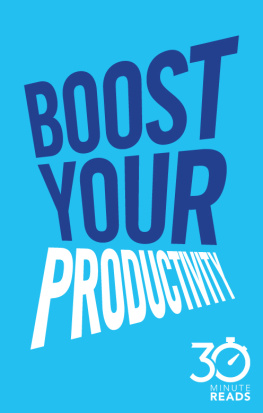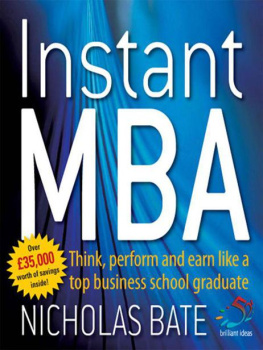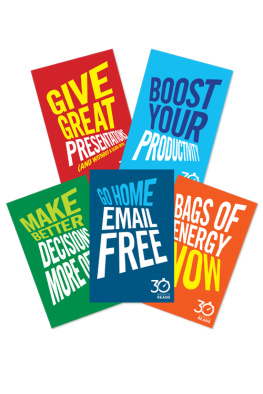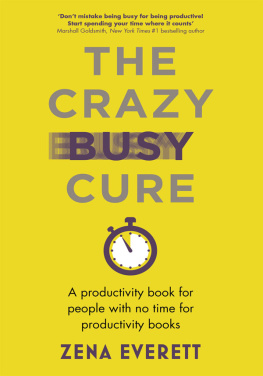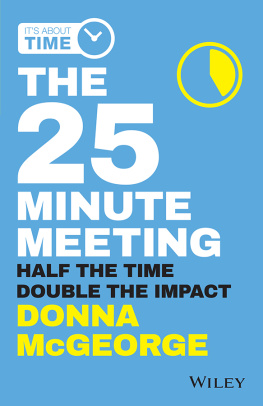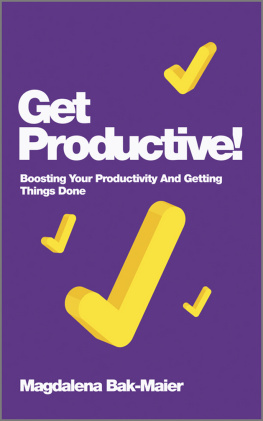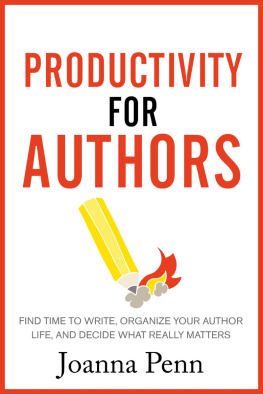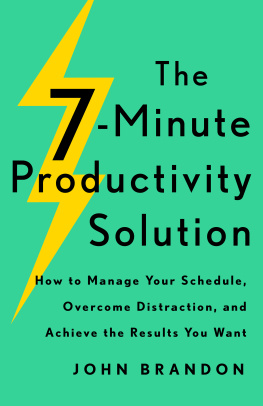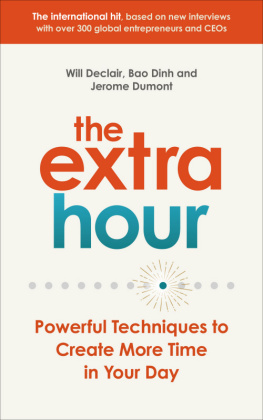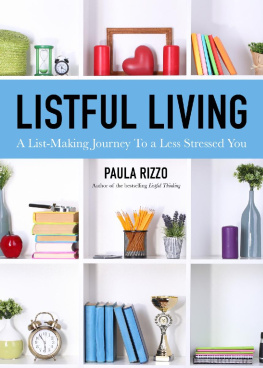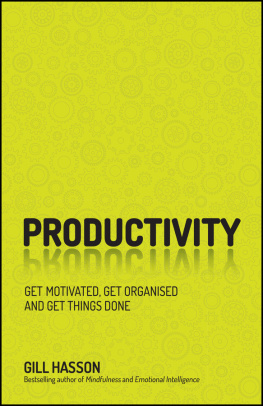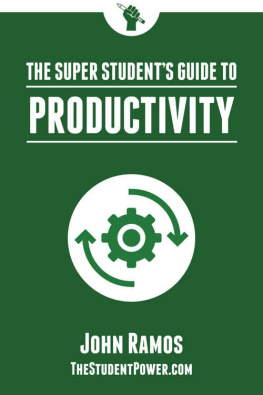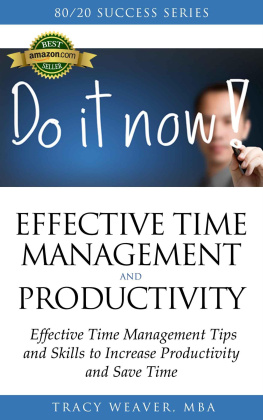
Table of Contents
What will this book do for you?
Everybody has too much to do; the call centre operator trying to clear the backlog of calls, the CEO running for her plane to JFK, the single mother juggling the school run and her home-based proofreading service.
Nobody has enough time: not the vicar trying to produce a great sermon for Sunday and see all those who need his attention; not the nurse trying to cover a large ward, nor the manager of the small corner shop.
A lot of people are worried. They can't say no as their job is on the line. They are already working very long hours. They are exhausted, the email won't go away and Twitter, which seemed so much fun at first, is now just a right pain.
Relax, help is at hand. Thoughtful, yet pragmatic. Practical and easy. Home and work. That's Boost Your Productivity: a primer for getting your life sorted, getting everything back on track and doing what is really important to you, not just who or what is shouting at you loudest.
Here's the structure of Boost Your Productivity
We're not going to dive in with lists, plans and continually saying no. We know it's got to be deeper than that. This will be a vital introduction.
It'll all come together if we know what the bigger picture is: that starts here.
And continues here.
And this is how we make our goals, plans and vision a reality on a day-to-day basis.
The simple ideas that really do make a huge difference at work.
It'd be so easy if it weren't for other people. How to get them thinking your way.
How to use the cleverness yet ignore the demands of the digital and virtual worlds.
How to get it all done and be happy in your personal life.
Now you have a great system, a few little curiosities to add to your skill portfolio.
Your personal checklist to success.
The majority of the sections will start with the big idea (e.g., stopping other people taking up your time unnecessarily) and then explain how to address that challenge in more detail. There will then be a mini case study: those at home or work with the same challenges you have, that we all have; this gives you a chance to see how they practically implement the concepts. We'll also make sure your toughest questions are answered before a final summary. Everything in this book is tried and tested: it is both pragmatic and practical. We encourage you to start using the ideas immediately as that's the way this digital version was designed.
Read on
The Philosophy
The Challenge
No, please don't skip this section! The word philosophy is perhaps a little daunting especially when you were just seeking some simple, pragmatic methods of getting more done, reducing the torrent of email and having some quality time with the children during the working week. The latter practical tips we will definitely, absolutely provide. And soon. But if you truly, deeply want to achieve or return to a state of peak productivity where you are achieving what you want to achieve, living the life you wish to live and not feeling exhausted doing it, a bit of philosophy is important. Go on: it's not so bad. You'll see!
No? Really, no? Then skip to where you will find practical tips galore. But please, do come back to this section when you have been reassured that such practical help is provided. This is the section that will ultimately allow you to understand where the real breakthrough in your personal productivity will be made.
The Detail
Philosophy? Yes, because there are some deeper questions we need to answer:
What do you mean by productivity?
Most begin to look at the field of time management and question their productivity because of overload: they find they simply cannot keep up with assignments and tasks without digging into their personal time and although they are willing to do that for a while, the consequent cost for quality of output, their most important relationships and their health increasingly becomes something they are not willing to accept. And much time management advice attempts to solve such challenges with quick fix tips, which rarely solve the true dilemma: the problem simply keeps coming back. We do want to solve it once and for all and it does require a robust answer to what do you really mean by productivity?
Thus: are you considering the bigger questions?
Because clearly at one level being productive is doing what you are paid to do if you are an employee. Or successfully running your business if you are self-employed. However that is only one dimension; in a simpler world it was reasonably straightforward to consider it in that way. But in the New World of Work to which we are all exposed of severe competition, 24 by 7 working and increasingly less distinction between home and work there are other implications we need to ponder, such as: Where is your career going? And how are you maintaining important friendships? And looking after your health? And managing your finances, not just for now, but also for the future? Perhaps if you are delivering on your quarterly targets you are being efficient (getting things done). But if you have become ill in the process you have not necessarily been effective (getting the right things done).
Do you know that it's pretty easy but it will require you to be different?
Much of time management methodology was first created in that simpler world. A world where we did less multi-tasking, where we had far fewer interrupts and putting it more bluntly our expectations of what we might do and achieve were much lower. But such approaches are no longer powerful enough: we need something that works for our very different lifestyles. And here's the tough bit: to be truly productive we will have to say no to a lot of things; we will have to address the digital dilemma of a world which floods into our brain at every opportunity. We will need to recognize that productivity is as much about our personal wellness as it is about our willingness to create a great list.
Thus, you are productive if:
- You hit your work goals, as that is what you are paid to do
- but at the same time you maintain your health
- and in particular, stress is at a minimum.
- You have a longer-term picture of where your career is going: you have set your
- Personal Compass with its consideration of all aspects of your life: relationships, future finances, simply having fun .
- You are not just efficient (i.e., getting things done) but also
- effective (getting the right things done).
- And the approaches you use to being productive are not only
- top down, i.e., consideration of the big picture Personal Compass but also
- bottom up, i.e., the day-to-day practicalities, for example, of running a family.
- You are feeling good, and
- you are contributing to your business and your community.
The Story
Things had not been at all easy for Karl since 2008. He and his family lived in Detroit, Michigan, USA and he had always been the main bread-winner. But from a well-paid job in the automotive industry he had been effectively downsized to a job that was well below his skill level and, particularly worryingly, had no real prospects of promotion or a secure career. And this with three growing children and college fees looming. There had been no family holiday for the last four years, the household food budget was really straining at the seams and the house needed significant repairs. Karl and his wife, Barbara, had always been pretty organized: there was a family board in the kitchen with the kids' timetables, general shopping list and a list of repairs to be done on the house. But it struck them that they were really not thinking deeply or creatively enough: they had to do something to get out of this rut. They were both frustrated that they seemed to have no time to think about what they really wanted or how to get what they needed. In fact, perhaps they could be a lot more productive.

